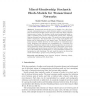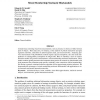1501 search results - page 1 / 301 » Discriminative Mixed-Membership Models |
ICDM
2009
IEEE
13 years 11 months ago
2009
IEEE
Although mixed-membership models have achieved great success in unsupervised learning, they have not been widely applied to classification problems. In this paper, we propose a f...
CORR
2010
Springer
12 years 12 months ago
2010
Springer
Abstract: Transactional network data can be thought of as a list of oneto-many communications (e.g., email) between nodes in a social network. Most social network models convert th...
ICML
2010
IEEE
13 years 6 months ago
2010
IEEE
Discrete mixed membership modeling and continuous latent factor modeling (also known as matrix factorization) are two popular, complementary approaches to dyadic data analysis. In...
NIPS
2008
13 years 6 months ago
2008
Consider data consisting of pairwise measurements, such as presence or absence of links between pairs of objects. These data arise, for instance, in the analysis of protein intera...
ICML
2009
IEEE
14 years 5 months ago
2009
IEEE
In a dynamic social or biological environment, interactions between the underlying actors can undergo large and systematic changes. Each actor can assume multiple roles and their ...


